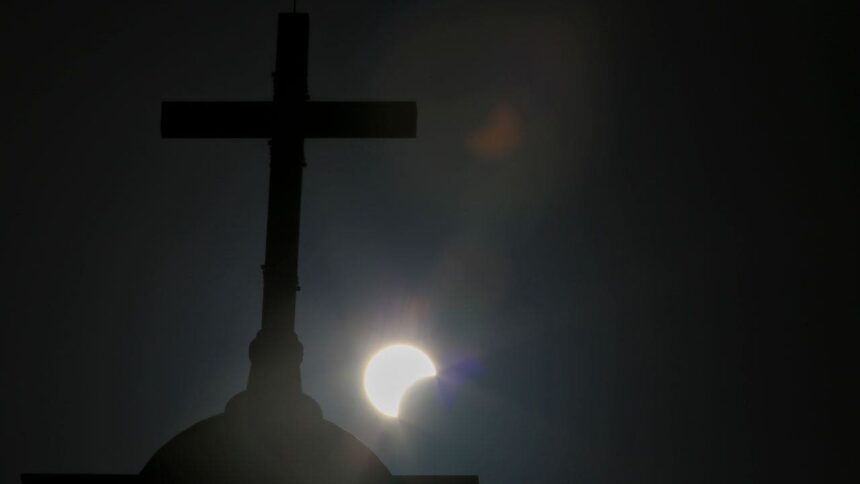All through historical past, photo voltaic eclipses have had profound impression on adherents of assorted religions around the globe. They have been seen as messages from God or religious forces, inducing feelings starting from dread to surprise.
Forward of the entire photo voltaic eclipse that can comply with a protracted path over North America on Monday, here is a take a look at how a number of of the world’s main religions have responded to such eclipses over the centuries and in trendy occasions.
Buddhism
Within the Tibetan Buddhist custom, it’s believed that the vitality of constructive and adverse actions is multiplied throughout main astronomical occasions reminiscent of a photo voltaic eclipse.
SOLAR ECLIPSE 2024: SONGS TO ROCK OUT TO DURING THE RARE COSMIC EVENT
In response to the late Lama Zopa Rinpoche with the Basis for the Preservation of the Mahayana Custom, each lunar and photo voltaic eclipses are auspicious days for religious follow. He has stated that the benefit — which represents the constructive karmic outcomes of excellent intentions and actions — generated on lunar eclipses is multiplied by 700,000 and on photo voltaic eclipses by 100 million. A number of the really useful religious actions on as of late embrace chanting mantras and sutras.
Christianity
Some Christians have believed that an eclipse portends the approaching of the “finish occasions” that can precede Christ’s return to Earth as prophesized at numerous factors within the Bible. One such passage is within the second chapter of Acts: “The solar will probably be turned to darkness and the moon to blood earlier than the approaching of the nice and wonderful day of the Lord.”
There additionally has been a persisting perception amongst some Christians that an eclipse occurred through the crucifixion as a result of three of the Bible’s 4 Gospels point out a three-hour interval of darkness as Jesus died.

A partial photo voltaic eclipse is seen behind a cross on the steeple of the St. George church, in downtown Beirut, Lebanon, on June 21, 2020. All through historical past, photo voltaic eclipses have been seen as messages from God or religious forces, inducing feelings starting from dread to surprise. (AP Photograph/Hassan Ammar, File)
“It was now about midday, and darkness came to visit the entire land till three within the afternoon, for the solar stopped shining,” says Luke 23:44.
It’s been famous {that a} three-hour interval of darkness doesn’t recommend a photo voltaic eclipse, which produces only some minutes of darkness.
However a current commentary on ChurchLeaders.com — a web site supported by quite a few outstanding evangelical pastors — stated the darkness depicted within the three Gospels “represents a profound religious transition.”
“The non permanent obscuring of the solar, juxtaposed with the last word sacrifice of Jesus, gives a strong metaphor for the transient nature of despair and the everlasting promise of salvation and rebirth,” the commentary says.
Hinduism
The origin of eclipses in Hinduism is defined in historic legends generally known as puranas. In a single legend, the devas and asuras, who symbolized good and evil respectively, churned the ocean to obtain the nectar of everlasting life. As one of many asuras, Svarbhanu, posed as a deva to obtain the nectar, the Solar god (Surya) and Moon god (Chandra) alerted Mohini, an incarnation of Lord Vishnu, who then used a discus to behead Svarbhanu.
However as a result of the asura had already consumed a portion of the nectar, his immortal however indifferent head and physique lived on below the names Rahu and Ketu. Legend has it that Rahu sometimes swallows the solar and the moon due to the gods’ half in his distress, inflicting photo voltaic and lunar eclipses.
Hindus usually regard a photo voltaic or lunar eclipse as a foul omen. Some observe fasts earlier than and many don’t eat through the interval of the eclipse. Observant Hindus ritually bathe to cleanse themselves through the first and ultimate phases of an eclipse. Some additionally supply prayers to ancestors. Most temples are closed at some stage in the eclipse. Devotees collect for prayers alongside pilgrimage websites close to holy rivers through the onset of an eclipse. The occasion is taken into account to be a very good time for prayer, meditation and chanting of mantras — all believed to push back evil.
Islam
In Islam, a photo voltaic eclipse is a time to show to God and pray. The eclipse prayer is predicated on narrations of sayings and actions of Prophet Muhammad.
Kaiser Aslam, Muslim chaplain on the Heart for Islamic Life at Rutgers College, stated one narration cited the prophet as saying: “The solar and the moon are two indicators amongst the indicators of Allah and they don’t eclipse due to the demise of somebody. … Everytime you see these eclipses pray and invoke (Allah).”
The story was that “after the demise of the Prophet Muhammad’s son, Ibrahim, his companions tried to consolation him by saying that the solar eclipsed because of the greatness of the loss,” Aslam stated. “The Prophet corrected them by reminding them that the solar and moon are indicators of God and to not add any superstitions as to why an eclipse occurs.”
On April 8, Aslam will lead the “kusuf” prayer on campus. Typically, there is a transient sermon after the prayer to clarify the teachings behind it and dispel any superstitions round it, he added.
“It’s a lovely and significant prayer that emphasizes our relationship with God’s creation, ensuring to present our devotion to God, as an alternative of incidental occurrences in God’s creation,” Aslam stated.
Mahmoud Alhawary, an official with Al-Azhar’s Islamic Analysis Academy in Cairo, stated it’s higher for the eclipse prayer to be carried out in congregation on the mosque, however that Muslims may additionally pray individually elsewhere.
The knowledge “is for the person to hunt refuge in God, requesting the lifting of this affliction,” Alhawary stated. “Folks ought to know that the occurrences of the entire universe are in God’s arms.”
Judaism
The Talmud — the gathering of writings compiled greater than 1,500 years in the past that represent Jewish spiritual legislation — gives particular blessings for a lot of pure phenomena, however not for eclipses. As an alternative, it depicts an eclipse as “an in poor health omen for the world.”
On Chabad.org — a web site serving an Orthodox Jewish viewers — Chicago-based Rabbi Menachem Posner sought to view the Talmud passage in a contemporary context, given the consensus that eclipses are pure occasions that may be predicted centuries upfront.
“Eclipses needs to be alternatives to extend in prayer and introspection — versus prompting joyous blessings,” Posner wrote. “It’s a signal that we actually might and needs to be doing higher.”
CLICK HERE TO GET THE FOX NEWS APP
Writing in early March for the Orthodox Jewish schooling group Aish, Rabbi Mordechai Becher famous that Judaism has longstanding interconnections with astronomy. He stated there are three craters on the moon named after medieval rabbis with experience in astronomy.
As for eclipses, Becher — an teacher at Yeshiva College — instructed they have been made potential by God for a profound cause.
“He created a system that might remind us commonly that our selections can create darkness, even at occasions when there needs to be mild,” he wrote. “Our free will selections can create a barrier between us and the Divine mild, however can even permit Divine mild to be seen right here.”








